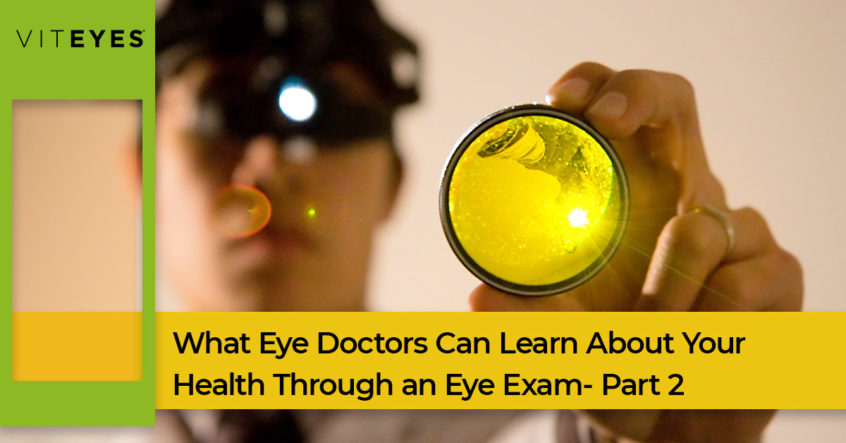Welcome back to our series on what your doctor can learn about your overall health condition through an eye exam. If you haven’t already done so, we encourage you to read part one.
Many diseases affect our eyes and vision and sometimes an eye exam reveals the clues about what is going on elsewhere in our bodies. Let’s take a look at more health risks your ophthalmologist may discover during your routine exam.
Hypertension
Hypertension or chronic high blood pressure is known as the silent killer because it does not often cause outwardly observable signs and symptoms may mimic other conditions or simply the stress of life. However, chronic high blood pressure is a dangerous condition and can lead to loss of vision, stroke, or heart attack. Hypertension quickly and extensively impacts your eyes and vision and can easily be seen on a routine eye exam. Hypertension causes swelling to the macula that causes vision changes and may cause permanent vision loss. Other indicators are damaged blood vessels or optic nerves caused by the high pressure in capillaries that may cause bursting, growth of new blood vessels, and pressure on the nerves. Keeping your blood pressure in a normal range is critical to your eye and heart health. If your eye doctor notes any of these abnormalities on your eye exam, they may refer you to a cardiologist or your primary care provider. It is important that you follow up quickly to get your blood pressure under control. To learn more about how hypertension can affect your vision, visit this online resource.

Thyroid Disease
Thyroid diseases including hypothyroidism and hyperthyroidism can be detected on a routine eye exam fairly easily and sometimes before a patient or their provider are aware that a thyroid disorder exists. Thyroid disease manifests as a variety of symptoms ranging from fatigue and weight gain to difficulty sleeping and concentrating, all of which may be underplayed or attributed to something else. Hyperthyroidism causes swelling of the tissues in the eye socket, causing the eyeballs to bulge. This bulging can range from barely noticeable to creating the appearance of very large protruding eyes which is classic of Grave’s disease, am autoimmune disorder that causes hypothyroidism. Hypothyroidism can cause hair loss, including that of your eyebrows and eyelashes. If your ophthalmologist detects signs of thyroid abnormalities on your eye exam, they will reference you to your primary care provider or endocrinologist. For more information about how thyroid disorders affect your vision, visit this online resource.
At Viteyes, we are passionate about helping support optimal eye health and vision by bringing awareness to conditions that affect the eyes and providing the eye supplements that give your eyes the nutrients they need. We hope that you’ll visit us online to learn more about your eyes and eye health as well as take advantage of our full line of premium eye vitamins. Stay tuned to our last installment of this series.
